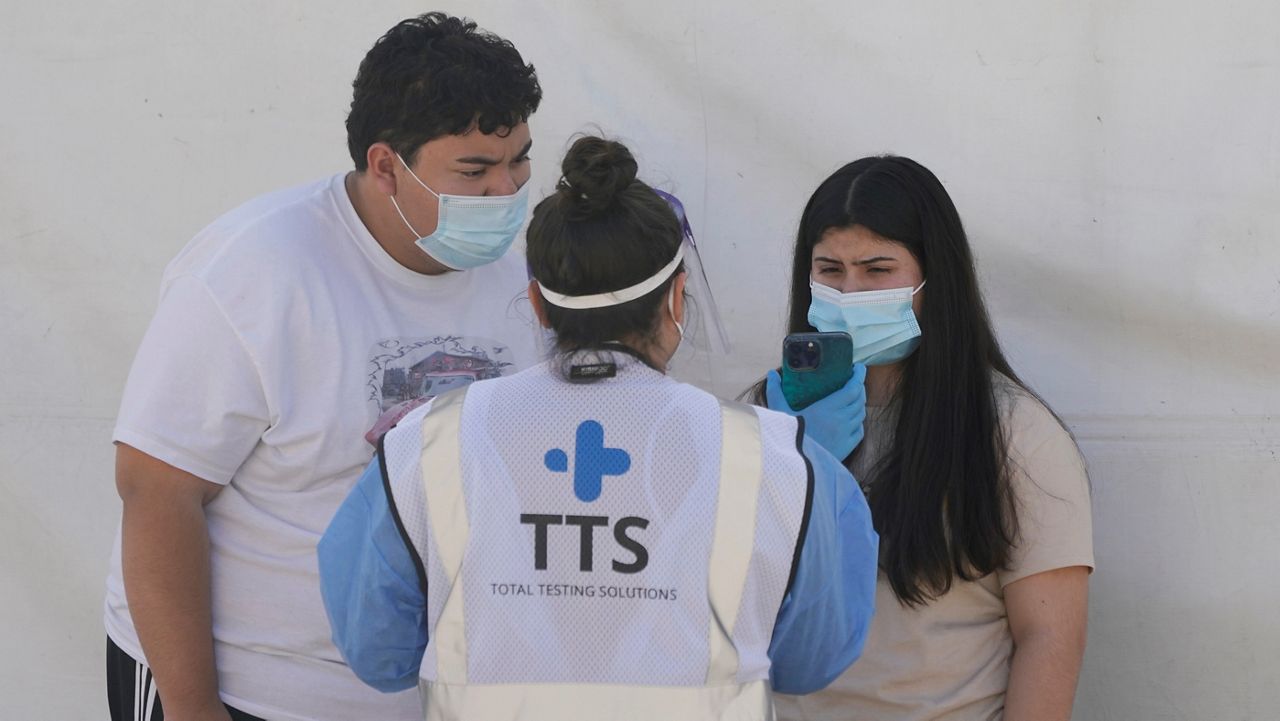LOS ANGELES (CNS) — While the winter surge of COVID-19 infections fueled by the omicron variant appears to be easing, authorities are watching the emergence of an omicron "sub-lineage" that has spread rapidly in some countries, with Los Angeles County's health director saying Thursday four cases have been found locally.
Barbara Ferrer told reporters in an online briefing that the original omicron variant, technically known as BA.1, remains the dominant variant circulating in Los Angeles County, representing more than 98% of sequenced cases as of early January. But with four cases of the omicron "sub-lineage" known as BA.2 now identified, she said officials will be awaiting answers from researchers about whether it could potentially lead to another surge.
"We don't yet know how BA.2 might be different than other omicron lineages, and scientists will be working rapidly in the coming weeks to learn more about immune evasion, severity and transmissibility," Ferrer said. "In places that have already passed their peak of omicron cases, it does appear that BA.2 is causing a new surge. In places at their peak of the omicron surge that have significant BA.2 prevalence, it doesn't appear that BA.2 is behaving dramatically different than other omicron lineages. And compared with other omicron lineages, BA.2 does not really have many unique mutations that would be impacting the part of the virus that's targeted by our immune system."
Ferrer said it's too early to sound any alarms over the BA.2 variant, since too many questions about its impact still need to be answered, but it should serve as a reminder to people that more COVID-19 variants could develop as long as the virus continues to spread. And that means continued adherence to infection-control measures — and vaccinations.
"It's very possible there could be another variant of concern in the future that can spread easily and contribute to another surge," Ferrer said. "Given the effectiveness of the FDA-authorized vaccines against at least four different known strains of the virus — we've had alpha, epsilon, delta and omicron — vaccines do remain our best tool for preventing COVID-19. Getting as many people vaccinated as soon as possible can help us sustain the declines we're seeing and limit opportunities in the future for new variants to arise."
Ferrer noted again that the county is seeing declines in case rates and hospitalizations, indicating the peak of the omicron case surge has passed.
"While the case and hospitalization declines give us cause for much-welcomed hope, we should not take them as a sign to forgo the common-sense protective measures that help to slow COVID-19 transmission in our county," she said. "Continuing these safety measures is needed to drive down cases to a much smaller number, which will ultimately end staffing shortages, reduce workplace and school outbreaks, and most importantly keep residents from becoming seriously ill and dying."
Ferrer noted that COVID-19 deaths remain relatively high, averaging about 59 per day in the county. On Thursday, the county reported 85 new virus-related deaths, raising the overall pandemic death toll to 28,715.
Another 26,010 new COVID cases were reported Thursday, giving the county a pandemic total of 2,586,739. The rolling daily average rate of people testing positive for the virus fell to 12.7%, down from around 20% earlier this month.
According to state figures, there were 4,323 COVID-positive patients in county hospitals as of Thursday, down from 4,534 on Wednesday. The number of those patients being treated in intensive care was 746, a drop from 780 a day earlier.
According to the county, 81% of eligible county residents aged 5 and above have received at least one dose of vaccine, and 72% are fully vaccinated. Only 32% are fully vaccinated with a booster shot. Of the county's overall 10.3 million population, 77% have received one dose, 69% are fully vaccinated, and 31% are vaccinated and boosted.
The vaccination rate among children aged 5-11 remains low, with only 31% having received at least one dose, and only 21% fully vaccinated. Ferrer said the low vaccination rate among children "creates significant vulnerability for spread" of the virus.
Of the more than 6.5 million fully vaccinated residents in the county, 580,942 have subsequently gotten infected with COVID, for a rate of 8.9%. That's a notably higher rate than December, when it was 2%, an increase Ferrer attributed to the highly transmissible omicron variant. But the number of fully vaccinated residents who have been hospitalized was 6,998 as of this month, for a rate of 0.1%. The number who have died is 886, for a rate of 0.01%.



